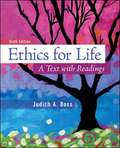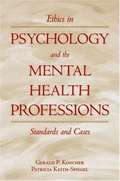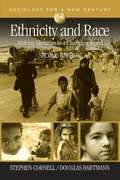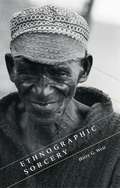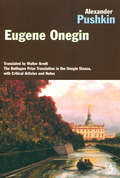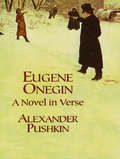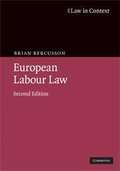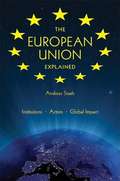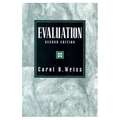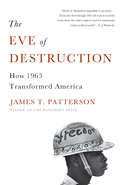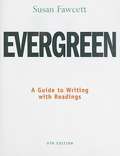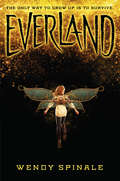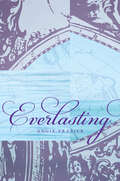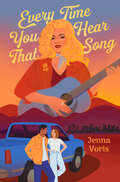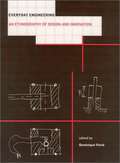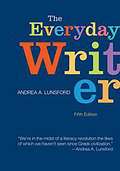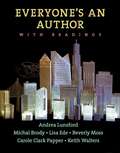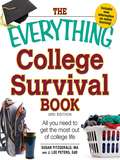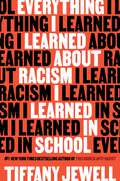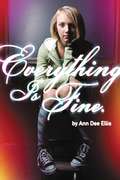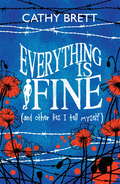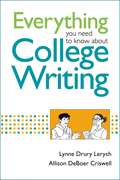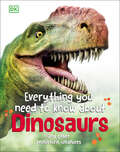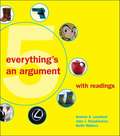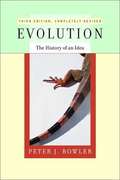- Table View
- List View
Ethics for Life (6th Edition)
by Judith A. BossA multicultural and interdisciplinary introductory ethics textbook that provides students with an ethics curriculum that has been shown to significantly improve student's ability to make real-life moral decisions.
Ethics in Psychology and the Mental Health Professions: Standards and Cases (3rd edition)
by Gerald P. Koocher Patricia Keith-SpiegelWe seek to present the full range of contemporary ethical issues in the mental health professions, not only as relevant and intriguing but also as integral and unavoidable aspects of the our complex professional roles and social responsibilities. Regardless of one's training speciality or the work setting, critical dilemmas will arise -- probably with some regularity--and we will often need to make challenging decisions or take intervention steps, sometimes right on the spot.
Ethnicity and Race: Making Identities in a Changing World
by Stephen Cornell Douglas HartmannCornell (sociology, U. of Arizona) and Hartmann (sociology, U. of Minnesota, Minneapolis) present an updated edition of their textbook for advanced undergraduate courses on race and ethnicity in the departments of sociology, ethnic studies, global studies, and anthropology. Revised throughout with new illustrative or empirical materials and updated references, the text includes new discussion of assimilation, the invisibility of racial dominance, and paradigms and analytical frames for understanding group relations, and a new case study on race, culture, and belonging in contemporary France. Annotation ©2007 Book News, Inc., Portland, OR (booknews.com)
Ethnographic Sorcery
by Harry G. WestAccording to the people of the Mueda plateau in northern Mozambique, sorcerers remake the world by asserting the authority of their own imaginative visions of it. While conducting research among these Muedans, anthropologist Harry G. West made a revealing discovery---for many of them, West's efforts to elaborate an ethnographic vision of their world was itself a form of sorcery. In Ethnographic Sorcery, West explores the fascinating issues provoked by this equation. A key theme of West's research into sorcery is that one sorcerer's claims can be challenged or reversed by other sorcerers. After West's attempt to construct a metaphorical interpretation of Muedan assertions that the lions prowling their villages are fabricated by sorcerers is disputed by his Muedan research collaborators, West realized that ethnography and sorcery indeed have much in common. Rather than abandoning ethnography, West draws inspiration from this connection, arguing that anthropologists, along with the people they study, can scarcely avoid interpreting the world they inhabit, and that we are all, inescapably, ethnographic sorcerers.
Eugene Onegin
by Alexander Pushkin Walter ArndtThis is the widely acclaimed translation of one of the outstanding and seminal works of Russian literature. Pushkin’s “novel in verse” has influenced Russian prose as well as poetry since its completion nearly 175 years ago. By turns brilliant, entertaining, romantic, and serious, it traces the development of a young Petersburg dandy as he deals with life and love. Influenced by Byron, Pushkin reveals the nature of his heroes through the emotional colorations found in their witty remarks, nature descriptions, and unexpected actions, all conveyed in stanzas of sonnet length (a form that became known as the Onegin Stanza), faithfully reproduced by Walter Arndt in this prize-winning translation. Includes extensive introduction, notes, and four critical essays.
Eugene Onegin: A Novel in Verse (Dedalus European Classics Ser. #No. Lxxii)
by Alexander Pushkin Babette DeutschThe most highly acclaimed of Pushkin's works, this 1831 romance depicts a post-Napoleonic society in which a jaded young aristocrat rejects the love of a country maiden. Adapted by Tchaikovsky for his opera, this classic tale appears in an outstanding translation that reproduces the 14-line stanza format of the original. Evocative lithographs grace the start of each chapter, and extensive supplements include an introduction, notes, and an appendix.
European Labour Law
by Brian BercussonEuropean Labour Law explores how individual European national legal systems, in symbiosis with the European Union, produce a transnational labour law system that is distinct and genuinely European in character. Professor Brian Bercusson describes the evolution of this system, its national, transnational and global contexts and its institutional and substantive structures. The collective industrial-relations dimension of employment is examined, and the labour law of the EU as manifested in, for example, European works councils is analysed. Important subjects which have traditionally received little attention in some European labour law systems are covered, for example, the fragmentation of the workforce into atypical forms of employment. Attention is also given to the enforcement of European labour law through administrative or judicial mechanisms and the European social dialogue at intersectoral and sectoral levels. This new edition has been extensively updated, as the EU's influence on this area of social policy continues to grow.
The European Union Explained: Institutions, Actors, Global Impact
by Andreas StaabThe European Union Explained provides a concise overview of the structure, history, and policies of the European Union. Anyone who needs a quick and accessible introduction to the EU - including scholars and professionals in government, business, media, or the non-profit sector - will find this volume a valuable tool. Ideal for advanced high school and college text use, it is also useful background reading for those planning overseas study, work, or research. Drawing on many years of teaching and consulting, Andreas Staab offers basic terms and interpretive frameworks for understanding the evolution of the EU; the overall structure, purpose, and mandate of its main constituent divisions; and key policy areas, such as market unification. Andreas Staab is founder and director of the European Policy Information Centre (EPIC), a London-based training agency on the European Union. He is author of National Identity in Eastern Germany as well as articles on citizenship, democracy, and European politics.
Evaluation: Methods for Studying Programs and Policies
by Carol H. WeissThis timely and accessible guide on the conduct of evaluation studies explores how we apply research methods in evaluating social programs, illustrating its points with reference to a variety of fields, including education, social services, and criminal justice. Offers practical advice on understanding the reasons for the study, identifying key questions to be answered, and planning and implementing the overall design of the study, including measurement, qualitative methods of inquiry, data collection, analysis, reporting, and dissemination. Stresses that understanding the underlying theory of the program is essential to developing the most appropriate evaluation, and emphasizes the need to take ethical considerations into account all along the course of the study. Covers meta-analysis, cost-benefit analysis and includes a non-technical discussion of the logic of data analysis. Includes references to further sources on measurement, existing longitudinal data sets, statistics, and qualitative analysis. For professionals in psychology, sociology, public health, public policy/affairs, education, and criminal justice.
The Eve of Destruction: How 1965 Transformed America
by James T. PattersonOf all the changes that have swept across America in the past century, perhaps none have been as swift or dramatic as those that transpired in the 1960s. The United States entered the decade still flush with postwar triumphalism, but left it profoundly changed: shaken by a disastrous foreign war and unhinged by domestic social revolutions and countercultural movements that would define the nation''s character, politics, and policies for decades to come. The prevailing understanding of the 1960s traces its powerful shockwaves to 1968, a year of violent protests and tragic assassinations. But in The First Year of the Sixties, esteemed historian James T. Patterson shows that it was actually in 1965 that America truly turned a corner and entered the new, tumultuous era we now know as "The Sixties. " In the early 1960s, America seemed on the cusp of a golden age. Political liberalism, national prosperity, and interracial civil rights activism promised positive change for many Americans. Although the nation had been shocked by the 1962 Cuban Missile Crisis and the 1963 assassination of President Kennedy, America''s fundamental traditions and mores remained intact. It was a time of consensus and optimism, and popular culture reflected this continuity. Young people dressed and behaved almost exactly as they did in the 1950s, and if the music and hairstyles of the British Invasion worried some conservative parents, these concerns were muted. At the beginning of 1965, Americans saw no indication that the new year would be any different. In January, President Johnson proclaimed that the country had "no irreconcilable conflicts. " Initially, events seemed to prove him right. The economy continued to boom, and the overwhelmingly Democratic Congress passed a host of historic liberal legislation, from the Voting Rights Act to Medicare and Medicaid to expansions of federal aid for education and the war on poverty. But Patterson shows that, even amidst these reassuring developments, American unity was unraveling. Turmoil erupted in the American South and overseas in the spring of 1965, with state troopers attacking civil rights demonstrators in Selma, Alabama and American combat troops rushing into Vietnam to protect American interests there. Many black leaders, meanwhile, were becoming disenchanted with nonviolence, and began advocating instead for African-American militancy. That summer, as anti-war protests reached a fever pitch, rioting exploded in the Watts area of Los Angeles; the six days of looting and fires that followed shocked many Americans and cooled their enthusiasm for the president''s civil rights initiatives, which--like his other "Great Society" programs--were also being steadily undermined by the costly and unpopular war in Vietnam. Conservative counterattacks followed, with Republicans like California gubernatorial candidate Ronald Reagan--and even some disillusioned Democrats--criticizing the President for mismanaging the war and expanding the federal government past its manageable limits. As Patterson explains, this growing pessimism permeated every level of society. By the end of 1965 the national mood itself had darkened, as reflected in a new strain of anti-establishment rock music by artists like the Rolling Stones, Bob Dylan, the Grateful Dead, and Jefferson Airplane. Their songs and lyrics differed dramatically from the much more staid recordings of contemporary acts like Frank Sinatra, Julie Andrews, and the Supremes, reflecting an alienation from mainstream American culture shared by an increasing number of young Americans. In The First Year of the Sixties, James T. Patterson traces the transformative events of this critical year, showing how 1965 saw an idealistic and upbeat nation derailed by developments both at home and abroad. An entire generation of Americans--as well as the country''s politics, culture, race relations, and foreign policies--would never be the same.
Evergreen: A Guide to Writing with Reading (9th edition)
by Susan FawcettEVERGREEN combines carefully crafted instruction, high-interest readings and student models, and plentiful practice exercises, to provide the most effective paragraph-to-essay-level Developmental Writing text on the market. The Ninth Edition includes expanded and revised coverage of writing essays, including an additional essay chapter and numerous additional student models. Photos enhance high-interest readings and promote critical viewing as well as critical thinking and clear writing.
Everland: A Prequel Novella To Everland (Everland #1)
by Wendy SpinaleForget the story of Peter Pan and Wendy you know. Because in Everland, the only way to grow up is to survive.London has been destroyed in a blitz of bombs and disease. The only ones who have survived are children, among them Gwen Darling and her siblings, Joanna and Mikey. They spend their nights scavenging and their days avoiding the ruthless Marauders -- the German Army led by Captain Hanz Otto Oswald Kretschmer. Unsure if the virus has spread past England's borders but desperate to leave, Captain Hook hunts for a cure, which he thinks can be found in one of the survivors. He and his Marauders stalk the streets snatching children for experimentation. None ever return. Until the day they grab Joanna. As Gwen sets out to save her, she meets a daredevil boy named Pete. Pete offers the assistance of his gang of Lost Boys and the fierce sharpshooter Bella, who have all been living in a city hidden underground. But in a place where help has a steep price and every promise is bound by blood, it will cost Gwen. And are she, Pete, the Lost Boys, and Bella enough to outsmart Captain Hook?
Everlasting
by Angie FrazierTHE LUXE meets A GREAT AND TERRIBLE BEAUTY meets INDIANA JONES.Sailing aboard her father's ship is all seventeen-year-old Camille Rowen has ever wanted. But as a lady in 1855 San Francisco, her future is set: marry a man she doesn't love in order to preseve her social standing. On her last voyage before the wedding, Camille learns the mother she has always believed dead is in fact alive and in Australia. When their Sydney-bound ship goes down in a gale, and her father dies, Camille sets out to find her mother and a map in her possession - a map believed to lead to a stone that once belonged to the legendary civilization of the (cont'd)
Every Time You Hear That Song
by Jenna VorisDumplin' meets Daisy Jones & the Six in this split-POV love song to country idols, romantic road trips, and queer love.They say never meet your idols. But nothing about digging up their deepest secrets.Seventeen-year-old aspiring journalist Darren Purchase has been a lifelong fan of country music legend Decklee Cassel, who&’s as famous for her classic hits as she is for her partnership with songwriter Mickenlee Hooper. The same Mickenlee who mysteriously backed out of the limelight at the height of their careers, never to be heard from again. Now Decklee&’s televised funeral marks the unveiling of her long-awaited time capsule. But when it&’s revealed to be empty, a trail of scavenger-hunt clues unfolds, leading to a whopping cash prize for whoever finds the real capsule. Darren knows there&’s a story there—and she&’s going to be the one to break it. Even if it means a spontaneous road trip with her coworker Kendall.Flashback to 1963, when a young runaway Decklee has her sights set on fame and glory. As she claws her way to the top over the years that follow, it&’s Mickenlee&’s lyrics that help rocket her to stardom. But as their relationship evolves beyond the professional, it threatens everything Decklee has worked for. What else will she sacrifice to hold on to her dreams?Told in alternating perspectives, Every Time You Hear That Song is a queer coming-of-age story celebrating country music, complicated women, and living authentically. There&’s more to Decklee&’s story than Darren ever could have guessed, but the real story she has to tell is her own.
Everyday Engineering: An Ethnography of Design and Innovation
by Dominique Vinck Eric BlancoEveryday Engineering was written to help future engineers understand what they are going to be doing in their everyday working lives, so that they can do their work more effectively and with a broader social vision. It will also give sociologists deeper insights into the sociotechnical world of engineering. The book consists of ethnographic studies in which the authors, all trained in both engineering and sociology, go into the field as participant-observers. The sites and types of engineering explored include mechanical design in manufacturing industries, instrument design, software debugging, environmental management within companies, and the implementation of a system for separating household waste. The book is organized in three parts. The first part introduces the complexity of technical practices. The second part enters the social and cultural worlds of designers to grasp their practices and motivations. The third part examines the role of writing practices and graphical representation. The epilogue uses the case studies to raise a series of questions about how objects can be taken into account in sociological analyses of human organizations.
The Everyday Writer
by Andrea A. LunsfordAndrea Lunsfords research shows that students are writing more than ever -- in classrooms, workplaces, and social spaces, in local communities and around the world. "The Everyday Writer," Fifth Edition, is the first tabbed handbook to help the participants in this "literacy revolution" build on the smart decisions they make as social writers -- and use their skills in their academic and professional work. With Andrea Lunsfords trademark attention to rhetorical choice and language, and with new chapters on public writing, critical reading, and understanding how and why to use documentation, "The Everyday Writer" gives today's students the information they need to be effective, ethical writers. New illustrations by graphic artist G. B. Tran make complicated concepts clear and inviting for students.
Everyone's An Author (With Readings)
by Andrea A. Lunsford Beverly J. Moss Michal Brody Lisa Ede Carole Clark Papper Keith WaltersEveryone's an Author focuses on writing as it really is today--with words, images, and sounds, in print and online--and encourages students to see the connections between their everyday writing and academic writing. It covers the genres college students need to learn to write--and teaches them to do so across media. It bridges the gap between Facebook and academic writing, showing how the strategies students use instinctively in social media can inform their academic writing. And it provides a strong rhetorical framework that guides students in the decisions they need to make as authors today. The version with readings includes an anthology of 35 readings.
The Everything® College Survival Book 3rd Edition
by Susan Fitzgerald MA J. Lee Peters EddCollege . . . Will your classes be as fun and exciting as they sound in the course catalog? Or will you find that you need to take advantage of your professors' office hours in order to keep up? Will ramen become your only meal? Will you get along with your roommate? From handling studying and dorm life to parties and campus safety, this guide gives you straight answers to help you survive college life. Experts Susan Fitzgerald and J. Lee Peters show you how to:Ace your papers and examsDeal with loud, rude, or eccentric roommatesPrepare for financial shock--and manage student loansPlan an incredible study abroad experienceTake care of yourself and keep your sanityYou will also find tips for packing for the big move, managing your money, making new friends, and balancing academics and your social life. With The Everything College Survival Book, 3rd Edition, you'll arrive on campus less stressed, ready for fun--and poised for success!
Everything I Learned About Racism I Learned in School
by Tiffany JewellFrom the #1 New York Times bestselling author of This Book Is Anti-Racist and The Antiracist Kid, Tiffany Jewell, this YA nonfiction book, highlighting inequities Black and Brown students face from preschool through college, is the most important, empowering read this year.From preschool to higher education and everything in between, Everything I Learned About Racism I Learned in School focuses on the experiences Black and Brown students face as a direct result of the racism built into schools across the United States.The overarching nonfiction narrative follows author Tiffany Jewell from early elementary school through her time at college, unpacking the history of systemic racism in the American educational system along the way. Throughout the book, other writers of the global majority share a wide variety of personal narratives and stories based on their own school experiences.Contributors include New York Times bestseller Joanna Ho; award winners Minh Lê, Randy Ribay, and Torrey Maldonado; authors James Bird and Rebekah Borucki; author-educators Amelia A. Sherwood, Roberto Germán, Liz Kleinrock, Gary R. Gray Jr., Lorena Germán, Patrick Harris II, shea wesley martin, David Ryan Barcega Castro-Harris, Ozy Aloziem, Gayatri Sethi, and Dulce-Marie Flecha; and even a couple of teen writers!Everything I Learned About Racism I Learned in School provides young folks with the context to think critically about and chart their own course through their current schooling—and any future schooling they may pursue.
Everything Is Fine.
by Ann Dee EllisStuck at home caring for her severely depressed mother and abandoned by her father, Mazzy has only the day-to-day dramas of her neighborhood to keep her busy. But between flirting with the boy next door and worrying about the fact that she's flat-chested, Mazzy has to face the fact that her mom is emotionally paralyzed by a family tragedy. As readers delve into the story, they'll eventually discover what it was that tore Mazzy's family apart, and they'll see what it takes to put it back together. Despite its serious subject matter, Mazzy brings humor to the trying age of adolescence and gives readers just the kind of awkward, troubled, and endearing character they will gladly embrace.
Everything Is Fine (And Other Lies I Tell Myself)
by Cathy BrettInterwoven with tales of World War I, this is a story about growing up, moving on and the strength of a family.Things haven't been going so well for fifteen-year-old Esther Armstrong. With her brother Max - her closest ally - absent, she's forced to face everything alone, not least her parents' heated arguments. As the summer holidays stretch endlessly ahead, she's desperate for something, anything, to divert her attention. Then she finds some letters hidden in the walls of her family home, sent by a soldier to his sweetheart from the trenches of WWI. Esther is consumed by the mystery of these lovers - not very much older than herself - and what became of them. Perhaps in piecing together the jigsaw of someone else's life, Esther can work out how to reassemble her own, and how to make everything fine again...
Everything You Need To Know About College Writing
by Allison Deboer Criswell Lynne Drury LerychIn their teaching, community college instructors Lynne Lerych and Allison DeBoer Criswell have discovered that a unique combination of humor and coaching helps overwhelmed students successfully master the conventions of academic writing. Now they have translated their experience into an engaging text to reach even the most wary students. Everything You Need to Know About College Writing is anchored by a sequenced, hands-on-approach to teaching rhetorical skills that help students face their fears of writing. This practical method starts by modeling each concept in action, then asks students to discuss and explore the concept together, and ends with an opportunity to practice. The authors' compelling tone--and presence as illustrated characters throughout the book-- keep students returning to the text for more on-the-page instruction. Filled with relevant student examples at every stage of the writing process, illustrated student writers whose progress and thought process the text follows, and engaging activities at when they're needed most, the text offers a unique way of untangling the toughest writing tasks while helping students to learn from mistakes. Plenty of grammar and mechanics coverage, plus tips throughout, help even the most reluctant writers stay on track. A mini-reader, a brief section on writing across the curriculum, and another on citation conventions appear at the end of the book to round out its robust support for all elements of a writing course in a small package.
Everything You Need to Know About Dinosaurs: And Other Prehistoric Creatures (Everything You Need to Know)
by DKA fun, fact-filled dive into the world of dinosaurs for kids-packed full of brilliant images.All the basics of these amazing creatures are covered in this beautiful and informative book on dinosaurs. Anatomy, along with habitat and behavior, and lots of fascinating facts about dinosaurs that every child will just love reading about. See how they survived all over the world, and how these prehistoric creatures adapted to their ancient habitats. Alongside, in between, and on top of all that, Everything You Need to Know About Dinosaurs also provides ideas for things to make, games to play, quizzes, and amazing facts to share with friends. Every spread is self-contained to make this a dip-into book with a difference. From the very first page it combines little-known information with engaging text and innovative, high-quality design.It's everything you need to know, and everything you want to find out.
Everything's an Argument with Readings (5th edition)
by Andrea A. Lunsford John J. Ruszkiewicz Keith WaltersThis best-selling combination rhetoric and thematically organized reader shows students how to analyze all kinds of arguments -- not just essays and editorials, but clothes, cars, ads, and Web site designs -- and then how to use what they learn to write their own effective arguments. With engaging, informal, and jargon-free instruction that emphasizes cultural currency, humor, and visual argument, Everything's an Argument is student-centered and immediately accessible. Students like this book because it helps them understand how a world of argument already surrounds them; instructors like it because it helps students construct their own arguments about that world.
Evolution: The History of an Idea (3rd Edition, Revised and Expanded)
by Peter J. BowlerA comprehensive and authoritative source on the development and impact of this most controversial of scientific theories. This new edition has been entirely rewritten to take account of the latest work of historians and scientists.
